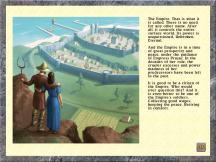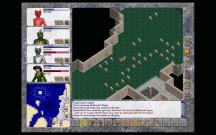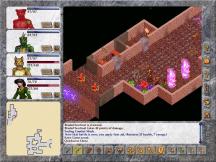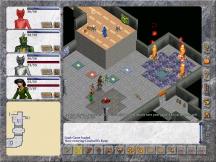Your donations keep RPGWatch running!
Avernum V Review
by Brian "Dhruin" Turner, 2008-05-14
There are many seeming contradictions in gaming. I've recently been playing some major release games along side Avernum V and on the surface you'd think the polished output from big producers should be more compelling than a little indie outfit that has used essentially the same engine for years and years. Not so. I found myself pulled back into Avernum V time and time again, even though prettier things were on offer.
In fact, with one particular game, the graphical fidelity meant I really struggled to accept some silly, minor issues that broke “the third wall”, while Avernum's minimal animations and evocative text let my imagination roam free. I know this won't work for everyone but if you've avoided Spiderweb's games because of the obviously ancient technology, you just might be surprised if you give it a go.
For those new to the series, Avernum is an original fantasy setting with a wealth of background stories built up over several games. The civilised world is ruled by an often tyrannical Empire who long ago decided to expel their criminals, agitators and dissidents to a subterranean series of caverns – the titular Avernum. Over time, Avernum has developed its own culture and become a self-sufficient “nation”, although it remains a dangerous world full of monsters and unsavoury outcasts.
Avernum V sees a period of relative peace interrupted by an assassination attempt against the moderate Empress Prazac from a hardline group called the Darkside Loyalists, who believe the Empire has become weak. The attempt fails and the assassins escape into the frontier lands in the far north of Avernum. Diplomatic relations are complicated – the Avernites aren't about to let the Empire's army march about freely – but a young recruit is acceptable as a message courier to start negotiations. So, as a fresh, new recruit into the Empire army, you find yourself in the wrong place at the right time, as it were, and suddenly at the forefront of the hunt for the enemy.
It's a pretty straightforward story but it works well to set up the gameplay. These northern lands are real frontier territory, far from the civilised and familiar parts of Avernum, so it makes sense to find dangerous lands full of pioneers looking for unsettled land and despots looking to oppress them. It also allows Spiderweb to avoid the well-travelled areas we've seen in past Avernum games and effectively change the atmosphere. Resources are tight this far from the major towns and the air of desperation adds a credibility to some of the simple fetch quests, while effectively underscoring the bigger scenarios. If you are looking for a tightly woven story with a big plot twist mid-game, this isn't it. It's more like the story in Fallout, where the simple premise overarches and ties together the party's travels.
It also helps make the linear structure more palatable. Most of the caves in this far north are connected by a big underground river and it makes sense for your quarry to flee down the river and for the areas to be strung along this meandering line. Each of the areas is typically large and offers plenty of opportunity to explore and undertake the myriad of quests on offer as you please. Some of the mid-game quests are fiendishly hard for the level you're likely to be when you run across them and you'll need to return to them later (using the convenient portals), breaking up the straight line travel. I also enjoyed using the boats scattered through the game to uncover hidden corners – although to be honest, this is probably underscored by a nostalgia for some of the Ultimas because the boats don't actually add anything to the gameplay - but they do add atmosphere.
While the overall game is linear, many of the quests offer choices and roleplaying opportunities. Each area typically has its own narrative and ultimate goal but there are also a slew of sidequests available. There are no set-in-concrete good vs evil paths but you'll get the opportunity to fashion your party as a hardline Empire soldier, more sympathetic to the troubles of the Avernites or just plain mercenary. At the start, the Avernites will react with suspicion and fear but you'll see this change somewhat over time if you take a more benevolent approach.
Joining the Darkside Loyalists is also an option – although this isn't one of those last-minute, one-dialogue-changes-everything affairs – you'll need to make the right choices at several junctures over half the game, culminating in the finale.
Other choices aren't about the Empire vs Avernum or chasing the traitor. For example, not long after the demo section finishes you'll meet a mage who will offer to make you more powerful in return for...some favours down the track. It's obvious there are strings attached – but what are they? I had great fun with the consequence of this choice, forced into situations I wouldn't have otherwise encountered.
Speaking of encounters, Jeff Vogel spoke in interviews prior to release about trying to remove the “trash” combats – those generic fights that serve only to fill out the content. The Avernum series has always leaned towards lots of combat – and Avernum V is no exception – but it's obvious that a lot of effort has been put into reducing random encounters and beefing up quest-related sequences and boss fights. And boy, are some of them memorable – the Soultaker's Pit, for example, is one of the most insidious dungeons I've played in a long time; equal parts frustratingly difficult but satisfying to finish.
Combat is definitely a central plank of the gameplay. As always, the combat model is based on a simple turn-based, party-based system that is solid and enjoyable but can get repetitive over the course of the game. I've reviewed four or five Spiderweb games over the last few years and one of my biggest complaints has been the lack of options for non-magic characters – there were plenty of overall tactics in party-building, positioning characters during encounters and managing buffs and spells across the group but if a character didn't use spells, they only had a standard attack (not including some passive abilities). Avernum V finally addresses this with Battle Disciplines and while the system isn't perfect, it's a welcome addition.
Battle Disciplines are special abilities that individual characters progressively unlock from a pool, based on a combination of their combat-related skill scores - which means with a couple of judicious choices mages and priests can also access them. During their turn, characters can add a Battle Discipline to their attack – they'll then have to wait a few turns for the fatigue to subside before using one again. Examples of Battle Disciplines include Shield Breaker, which makes foes more vulnerable to attacks for a few rounds and Berserker Rage, which adds some buffs for a while in return for a small reduction in health.
I've seen some criticism that only the highest Disciplines are worthwhile but I found them quite useful. Given that weak characters can easily get access to some of the basic abilities, I found it very useful to fire off a Shield Breaker just before a stronger fighter used Mighty Blow, or use Leg Sweep against a powerful enemy to soften their attacks for a while. They can even be combined with a spell attack, so I'm sure creative players can find some interesting combinations While the Disciplines are still easily overshadowed by magic and I'd like a larger, branching skill tree to work through, it definitely improves the combat.
Much as I really enjoyed the adventure, there are a few complaints I'd like to see addressed. First, I'd really like more information in a number of areas – is it better to put a point into Mage Spells or Spellcraft, for example? Where does Magery fit in? Buffing gets very repetitive and it isn't clear how effective (or redundant) some of the options are. No doubt experienced (or patient) players will simply experiment to find the answers but I'd appreciate better feedback within the user interface.
I'd also like to see more influence from Geneforge, which typically features dialogue with skill checks and deeper factional choices. That said, Avernum has always been about classic party adventuring and should be weighed on that basis.
The biggest issue for returning players might be fatigue – have they seen all this before? The answer really depends on what you expect – yes, the graphical and UI improvements are “only” incremental and, yes, most of the mechanics are familiar but I think that devalues the work Spiderweb has put into the story, the encounters and the Battle Disciplines. Remember the grand, classic roleplaying adventures before the current crop of 20-30 hour cinematic action games that dominate the genre? Spiderweb is the only company still regularly producing those and Avernum V is a worthy addition. Check out the generous demo.
In fact, with one particular game, the graphical fidelity meant I really struggled to accept some silly, minor issues that broke “the third wall”, while Avernum's minimal animations and evocative text let my imagination roam free. I know this won't work for everyone but if you've avoided Spiderweb's games because of the obviously ancient technology, you just might be surprised if you give it a go.
For those new to the series, Avernum is an original fantasy setting with a wealth of background stories built up over several games. The civilised world is ruled by an often tyrannical Empire who long ago decided to expel their criminals, agitators and dissidents to a subterranean series of caverns – the titular Avernum. Over time, Avernum has developed its own culture and become a self-sufficient “nation”, although it remains a dangerous world full of monsters and unsavoury outcasts.
Avernum V sees a period of relative peace interrupted by an assassination attempt against the moderate Empress Prazac from a hardline group called the Darkside Loyalists, who believe the Empire has become weak. The attempt fails and the assassins escape into the frontier lands in the far north of Avernum. Diplomatic relations are complicated – the Avernites aren't about to let the Empire's army march about freely – but a young recruit is acceptable as a message courier to start negotiations. So, as a fresh, new recruit into the Empire army, you find yourself in the wrong place at the right time, as it were, and suddenly at the forefront of the hunt for the enemy.
It's a pretty straightforward story but it works well to set up the gameplay. These northern lands are real frontier territory, far from the civilised and familiar parts of Avernum, so it makes sense to find dangerous lands full of pioneers looking for unsettled land and despots looking to oppress them. It also allows Spiderweb to avoid the well-travelled areas we've seen in past Avernum games and effectively change the atmosphere. Resources are tight this far from the major towns and the air of desperation adds a credibility to some of the simple fetch quests, while effectively underscoring the bigger scenarios. If you are looking for a tightly woven story with a big plot twist mid-game, this isn't it. It's more like the story in Fallout, where the simple premise overarches and ties together the party's travels.
It also helps make the linear structure more palatable. Most of the caves in this far north are connected by a big underground river and it makes sense for your quarry to flee down the river and for the areas to be strung along this meandering line. Each of the areas is typically large and offers plenty of opportunity to explore and undertake the myriad of quests on offer as you please. Some of the mid-game quests are fiendishly hard for the level you're likely to be when you run across them and you'll need to return to them later (using the convenient portals), breaking up the straight line travel. I also enjoyed using the boats scattered through the game to uncover hidden corners – although to be honest, this is probably underscored by a nostalgia for some of the Ultimas because the boats don't actually add anything to the gameplay - but they do add atmosphere.
While the overall game is linear, many of the quests offer choices and roleplaying opportunities. Each area typically has its own narrative and ultimate goal but there are also a slew of sidequests available. There are no set-in-concrete good vs evil paths but you'll get the opportunity to fashion your party as a hardline Empire soldier, more sympathetic to the troubles of the Avernites or just plain mercenary. At the start, the Avernites will react with suspicion and fear but you'll see this change somewhat over time if you take a more benevolent approach.
Joining the Darkside Loyalists is also an option – although this isn't one of those last-minute, one-dialogue-changes-everything affairs – you'll need to make the right choices at several junctures over half the game, culminating in the finale.
Other choices aren't about the Empire vs Avernum or chasing the traitor. For example, not long after the demo section finishes you'll meet a mage who will offer to make you more powerful in return for...some favours down the track. It's obvious there are strings attached – but what are they? I had great fun with the consequence of this choice, forced into situations I wouldn't have otherwise encountered.
Speaking of encounters, Jeff Vogel spoke in interviews prior to release about trying to remove the “trash” combats – those generic fights that serve only to fill out the content. The Avernum series has always leaned towards lots of combat – and Avernum V is no exception – but it's obvious that a lot of effort has been put into reducing random encounters and beefing up quest-related sequences and boss fights. And boy, are some of them memorable – the Soultaker's Pit, for example, is one of the most insidious dungeons I've played in a long time; equal parts frustratingly difficult but satisfying to finish.
Combat is definitely a central plank of the gameplay. As always, the combat model is based on a simple turn-based, party-based system that is solid and enjoyable but can get repetitive over the course of the game. I've reviewed four or five Spiderweb games over the last few years and one of my biggest complaints has been the lack of options for non-magic characters – there were plenty of overall tactics in party-building, positioning characters during encounters and managing buffs and spells across the group but if a character didn't use spells, they only had a standard attack (not including some passive abilities). Avernum V finally addresses this with Battle Disciplines and while the system isn't perfect, it's a welcome addition.
Battle Disciplines are special abilities that individual characters progressively unlock from a pool, based on a combination of their combat-related skill scores - which means with a couple of judicious choices mages and priests can also access them. During their turn, characters can add a Battle Discipline to their attack – they'll then have to wait a few turns for the fatigue to subside before using one again. Examples of Battle Disciplines include Shield Breaker, which makes foes more vulnerable to attacks for a few rounds and Berserker Rage, which adds some buffs for a while in return for a small reduction in health.
I've seen some criticism that only the highest Disciplines are worthwhile but I found them quite useful. Given that weak characters can easily get access to some of the basic abilities, I found it very useful to fire off a Shield Breaker just before a stronger fighter used Mighty Blow, or use Leg Sweep against a powerful enemy to soften their attacks for a while. They can even be combined with a spell attack, so I'm sure creative players can find some interesting combinations While the Disciplines are still easily overshadowed by magic and I'd like a larger, branching skill tree to work through, it definitely improves the combat.
Much as I really enjoyed the adventure, there are a few complaints I'd like to see addressed. First, I'd really like more information in a number of areas – is it better to put a point into Mage Spells or Spellcraft, for example? Where does Magery fit in? Buffing gets very repetitive and it isn't clear how effective (or redundant) some of the options are. No doubt experienced (or patient) players will simply experiment to find the answers but I'd appreciate better feedback within the user interface.
I'd also like to see more influence from Geneforge, which typically features dialogue with skill checks and deeper factional choices. That said, Avernum has always been about classic party adventuring and should be weighed on that basis.
The biggest issue for returning players might be fatigue – have they seen all this before? The answer really depends on what you expect – yes, the graphical and UI improvements are “only” incremental and, yes, most of the mechanics are familiar but I think that devalues the work Spiderweb has put into the story, the encounters and the Battle Disciplines. Remember the grand, classic roleplaying adventures before the current crop of 20-30 hour cinematic action games that dominate the genre? Spiderweb is the only company still regularly producing those and Avernum V is a worthy addition. Check out the generous demo.
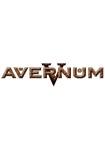
Information about
Avernum 5Developer: Spiderweb Software
SP/MP: Single-player
Setting: Fantasy
Genre: RPG
Combat: Turn-based
Play-time: Over 60 hours
Voice-acting: None
Regions & platforms
Internet
· Homepage
· Platform: PC
· Released: 2008-02-18
· Publisher: Spiderweb Software
More information
Summary
Pros
- Classic, party-based adventuring
- Improved combat and encounters
- Strong story and atmosphere
- Loads of quests
- Boats!
Cons
- Main spine is linear
- Not enough in-game information
- No dialogue skills
- Can be combat heavy
Rating
This review is using RPGWatch's old style of rating. See 'How we review' link below


